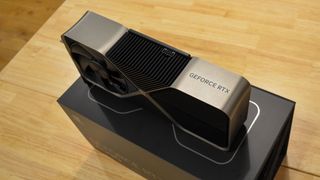Want to buy an RTX 4090 GPU? Nvidia’s testing a ‘priority access’ scheme with a catch
GeForce Experience is a requirement for an invite, and not everyone’s happy about that

Nvidia is testing out a new idea to give folks a shot at buying an RTX 4090 with a ‘Verified Priority Access’ system that means you can avoid the pain of having to keep an eye out for stock online (though don’t forget, we do the hard work for you in that respect with our fully up-to-date guide to RTX 4090 stock that’s available).
Right now, this is just a trial program, and it’s one which comes with a slightly controversial catch, at least for some folks – the necessity to have Nvidia’s GeForce Experience (GFE) suite installed (more on that later).
Those with GFE on their PC and an Nvidia graphics card – either a GTX 10 Series, GTX 16 Series, or RTX 2000 or RTX 3000 GPU – have a chance of getting a priority invite which contains a link to a retailer where they can buy an RTX 4090 Founders Edition there and then. (Note that this is still “while supplies last”).
Nvidia posted to let us know about the scheme (as VideoCardz noticed), stating that: “We know it’s often challenging to purchase a new product close to launch date for a variety of reasons. Today, we’re testing a program we call verified priority access – which will give a limited number of GeForce gamers & creators an opportunity to purchase a GeForce RTX 4090 Founders Edition graphics card.
“Invited users receive a GeForce Experience in-app notification that generates a unique URL – connecting invitees to a Founders Edition partner in select regions. Currently, testing for verified priority access includes: Best Buy (United States), Scan (United Kingdom), NBB (Germany & Netherlands), and LDLC (France, Italy, and Spain).”
So as you can see, aside from having GFE installed, the other caveat here is that it’s only certain regions which are involved in this trial scheme right now.
Analysis: A somewhat divisive idea? And how does it pick the lucky buyers, anyway?
This is causing a fair bit of controversy in some quarters, as you might imagine. For starters, some gamers (or indeed content creators) are not at all keen on GFE, believing it to be mostly pointless bloat, and indeed not wanting to create an account with Nvidia to run it. They’d rather simply have a bare installation of the Nvidia graphics driver.
Get daily insight, inspiration and deals in your inbox
Get the hottest deals available in your inbox plus news, reviews, opinion, analysis and more from the TechRadar team.
Those people obviously have no chance of a priority invite, and aren’t too happy with the theory that this is a handy way for Nvidia to boost the number of installations of GFE.
There’s a degree of miffed-ness, then, as to why Nvidia couldn’t just set up a simple queue system for the RTX 4090 Founders Edition (as has been seen elsewhere in the past).
That said, negative reaction is very much from the minority, and there are more folks questioning how the Verified Priority Access scheme actually works, than there are shaking their fists at Team Green and demanding that it’s abandoned. (Remember, it is just a trial at this point, so Nvidia is still testing the waters effectively).
Questions include if there’s any rhyme or reason as to who is selected from GFE users to receive an invite, with no real conclusions being drawn there. We do know that you must have one of the above mentioned Nvidia GPUs (so anything from the GTX 900 Series or earlier is no good), and aside from that, there’s one other thing to do if you’re keen to get an invite. Make sure that your offers are enabled in GFE (in your personal info, there’s an option to receive offers, and if this isn’t switched on, obviously you won’t get any).
Folks have further theorized that it helps to have updated to the very latest Nvidia driver, so there’s that possibility too. That fresh driver adds RTX 4090 support, so we guess there’s some logic to this idea, of a fashion.
Most likely, though, this selection process is entirely random, or perhaps that and also partially based on whether the specified retail outlets local to any given user actually have stock left of the Lovelace flagship GPU.
Darren is a freelancer writing news and features for TechRadar (and occasionally T3) across a broad range of computing topics including CPUs, GPUs, various other hardware, VPNs, antivirus and more. He has written about tech for the best part of three decades, and writes books in his spare time (his debut novel - 'I Know What You Did Last Supper' - was published by Hachette UK in 2013).
